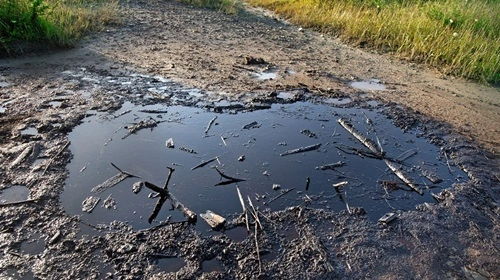Yes, it is illegal to dump oil on the ground in the United States. Both federal and state laws prohibit the improper disposal of used motor oil or other petroleum products, as they can cause significant environmental harm and pose risks to public health. Violators can face steep fines, cleanup costs, and even criminal charges.
Understanding the Legal Framework
The disposal of oil is strictly regulated to prevent contamination of soil, water, and air. Dumping oil on the ground is considered hazardous waste disposal and is governed by multiple federal and state laws.
1. Federal Laws
Resource Conservation and Recovery Act (RCRA):
- Under RCRA, used oil is classified as a regulated waste. The law mandates proper disposal or recycling to prevent harm to the environment.
- Dumping oil on the ground is considered “illegal disposal of hazardous waste” and is subject to fines and penalties.
Clean Water Act (CWA):
- Oil that seeps into the ground can contaminate waterways, including streams, rivers, and groundwater. The CWA prohibits the discharge of pollutants into navigable waters without a permit.
Oil Pollution Act (OPA):
- The OPA regulates oil spill prevention and cleanup, emphasizing proper handling and disposal of oil to avoid contamination.
2. State Laws
In addition to federal regulations, each state enforces its own laws regarding oil disposal. Most states require individuals and businesses to recycle used oil or dispose of it at authorized collection centers. Examples include:
- California: The California Integrated Waste Management Act mandates recycling and imposes fines for illegal disposal of used oil.
- Florida: State law prohibits the dumping of oil into the ground, water, or storm drains, and violators can face civil and criminal penalties.
- Texas: The Texas Commission on Environmental Quality (TCEQ) enforces strict rules for the disposal of oil and imposes penalties for contamination.
Why Dumping Oil Is Illegal
Dumping oil on the ground is a major environmental hazard. A single gallon of used motor oil can contaminate up to one million gallons of water, making it unsafe for drinking, irrigation, and wildlife.
1. Soil and Water Contamination
Oil dumped on the ground seeps into the soil and can reach groundwater supplies, contaminating drinking water sources and agricultural land.
2. Harm to Wildlife and Ecosystems
Oil runoff into rivers and streams harms aquatic life by disrupting ecosystems, poisoning fish, and destroying habitats.
3. Air Pollution
Burning or improperly disposing of oil releases harmful chemicals into the air, contributing to air pollution and health problems for nearby residents.
Legal Consequences of Dumping Oil
Improper disposal of oil is a serious offense that can lead to:
1. Fines: Federal fines under RCRA can reach up to $70,000 per day for each violation and the state fines vary but can exceed $10,000 per offense.
2. Cleanup Costs: Individuals or businesses responsible for dumping oil may be required to pay for the cleanup and restoration of contaminated sites.
3. Criminal Charges: Repeat offenders or those who cause significant environmental harm may face misdemeanor or felony charges, leading to imprisonment.
4. Civil Liability: Affected parties, such as neighboring property owners, may file lawsuits to recover damages caused by contamination.
Proper Ways to Dispose of Oil
To avoid legal and environmental consequences, follow these steps for proper oil disposal:
- Recycle Used Oil: Most auto repair shops, recycling centers, and hazardous waste facilities accept used oil for recycling.
- Use Designated Containers: Store used oil in a clean, sealed container to prevent spills and leaks.
- Follow Local Guidelines: Check your state or city regulations for oil disposal and recycling programs.
Recent Legal Updates (2023-2024)
1. Stricter Enforcement
States like New York and California have increased enforcement efforts to crack down on illegal oil dumping. Enhanced penalties and public awareness campaigns aim to deter violations.
2. Incentives for Recycling
Some states, including Oregon and Washington, now offer financial incentives to encourage residents to recycle used oil at designated centers.
3. Environmental Remediation Programs
The federal government has allocated additional funds for cleaning up contaminated sites under the Superfund Program, prioritizing areas impacted by illegal oil dumping.
FAQs About Dumping Oil on the Ground
Q1. Is it illegal to dump oil on my own property?
Ans: Yes, dumping oil on private property is illegal. Federal and state laws prohibit improper disposal regardless of land ownership.
Q2. What should I do if I see someone dumping oil?
Ans: Report the incident to your state’s environmental agency or the Environmental Protection Agency (EPA). Many states have hotlines for reporting illegal dumping.
Q3. Can I face jail time for dumping oil?
Ans: Yes, in severe cases, dumping oil can result in criminal charges that carry jail sentences, particularly if it causes significant environmental harm.
Q4. Are there free disposal options for used oil?
Ans: Yes, many recycling centers, auto repair shops, and hazardous waste facilities accept used oil for free. Some states also offer curbside collection for used oil.
Q5. What happens if oil accidentally spills on the ground?
Ans: Accidental spills must be reported to local environmental agencies. You may be required to clean up the spill using approved methods and materials.

